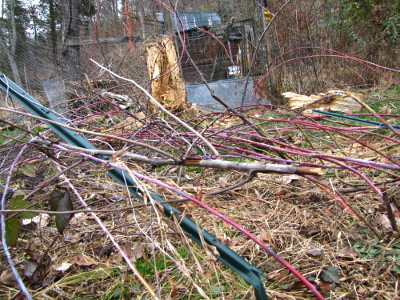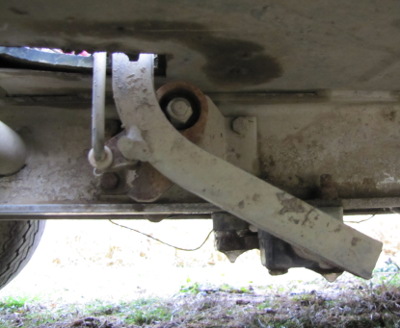
Frozen golf cart pedal
 Mark is the type of
considerate husband who doesn't post details on the internet when his
wife wrecks the golf cart. So I have to tell you myself.
Mark is the type of
considerate husband who doesn't post details on the internet when his
wife wrecks the golf cart. So I have to tell you myself.
Remember how icicles
were forming on the underside of the golf cart as we hauled in supplies
Sunday? They also started affecting the "gas" pedal. I
didn't realize that was the case until I went to turn the golf cart
around and reversed right through my berry patch, shrieking in terror
the whole way.
It turns out that when
the "gas" pedal sticks in the on position, slamming your foot on the
brakes does absolutely nothing. Yes, I did manage to halfway tear
down one of our  chicken pasture gates at the
same time. Mark considers it an unusual day when I don't break
something and ask him to fix it --- this wasn't an unusual day.
chicken pasture gates at the
same time. Mark considers it an unusual day when I don't break
something and ask him to fix it --- this wasn't an unusual day.
For future reference, if
you drive your golf cart through a creek repeatedly when the
temperature is in the teens, a big lump of ice will form around the
"gas" pedal mechanism. This makes the pedal stick in the on
position, but you can work around it by getting in the habit of pushing
the pedal, then slipping your foot underneath and pulling the pedal
back to "off." If you get really good, you can also push the
"gas" pedal very lightly and have it freeze halfway down, setting the
golf cart on cruise control at a moderate pace.
 I drove like that for three
trips on Sunday and one on Monday, but then my fun came to an abrupt
end. After unloading the golf cart, I headed inside to get a
drink of water, and when I came back out, pressing the "gas" pedal did
nothing. I thought I'd really broken the golf cart that time, and
I could see Mark's dreams of an ATV coming to fruition. Luckily,
when the afternoon sun melted the lump of ice around the pedal
mechanism, the golf cart sprang back to life and she was able to haul
one more load of straw Tuesday morning before the floodplain thawed so
much as to become impassable. I love our alternative farm truck!
I drove like that for three
trips on Sunday and one on Monday, but then my fun came to an abrupt
end. After unloading the golf cart, I headed inside to get a
drink of water, and when I came back out, pressing the "gas" pedal did
nothing. I thought I'd really broken the golf cart that time, and
I could see Mark's dreams of an ATV coming to fruition. Luckily,
when the afternoon sun melted the lump of ice around the pedal
mechanism, the golf cart sprang back to life and she was able to haul
one more load of straw Tuesday morning before the floodplain thawed so
much as to become impassable. I love our alternative farm truck!
(As a final note, will
someone please tell me what the "gas" pedal is called in an electric
vehicle?")
Want more in-depth information? Browse through our books.
Or explore more posts by date or by subject.
About us: Anna Hess and Mark Hamilton spent over a decade living self-sufficiently in the mountains of Virginia before moving north to start over from scratch in the foothills of Ohio. They've experimented with permaculture, no-till gardening, trailersteading, home-based microbusinesses and much more, writing about their adventures in both blogs and books.
Want to be notified when new comments are posted on this page? Click on the RSS button after you add a comment to subscribe to the comment feed, or simply check the box beside "email replies to me" while writing your comment.

I used to drive an electric car and we called it the GO pedal.
I got a good laugh out of your story... I'm pretty sure my husband thinks the same way, I'm always messing something up that he has to fix up later! I consider myself the Project Starter
The "go" pedal?
More seriously, I'd guesss it's call the accelorator pedal.
Sounds like you have even more fun with your golf cart than I do with my lawn mower!
De --- The Go Pedal it is! (And I'm glad to hear I'm not the only one who manages to break everything....)
MamaHomesteader --- I did something like that when learning to drive too. We were pulling up to the edge of a parking lot that ended in a four foot drop and I hit the gas instead of the brakes. (No, I didn't go over. Good thing for curbs...)
Bethany --- "Accelerator" --- I'll bet that's the real word!
I do get quite a kick out of the golf cart....
Your usage is probably way outside the design parameters of this golf kart. Especially driving it through the creek. You're probably submerging the transmission and maybe even the engine. Of course this should be able to resist rain, water spray and such, but not immersion.
The same goes for the brakes; drum brakes are generally water resistant but not waterproof. If you drive them though water the brakes will get wet inside and could foul up. And they generally retain a little water which acts as a lubricant and reduces the efficiency of the brakes (until the brakes become hot enough to vaporize the water, wich probably won't happen on a golf kart).
Since braking was not effective with the engine running, are the brakes well adjusted and are the brake shoes not worn too much? Brake shoes usually have some kind of wear indicator.
As far as I know, even dunking a battery in water will not make it short-circuit violently (as opposed to e.g. touching both leads with a spanner; don't do that ). But nevertheless I think that getting the battery pack or electronics wet is probably not advisable.
). But nevertheless I think that getting the battery pack or electronics wet is probably not advisable.
Doesn't this thing have a big red dead-mans-switch to kill the power?
If you are ever going to contemplate getting another golf kart, look for one that is suitable for off-road use. (higher ground clearance, 4WD, waterproof drive components and battery pack, disk brakes etc.)
Mitsy --- Mark had so much to say in answer to your question that I think he's going to post about it in a day or two. Stay tuned!
Anonymous --- thanks! Always good to have the right words.
Roland --- We push the golf cart far harder than it's meant to go, but I'm surprised by how well it handles the abuse. We do submerge the batteries from time to time when we misjudge water levels going through the ford --- it just stops for a minute, then starts again once it rolls out of the water.
We actually had the brake pads replaced just a couple of months ago, and when we brought the golf cart to the shop, that mechanic adjusted them a bit more. It must just be the water....
The only kill switch is turning the key in the ignition. I was too surprised to think of that, and, in retrospect, it's much more fiddly to turn a key than to jerk the pedal back into place, so it probably wouldn't have helped anyway.
juice pedal. To give 'er more juice just press down.
"juice 'er a bit to get out of the rut"
From the schematics I've seen, the electronics on a golf kart are relatively low-tech, especially old models from before the time of power electronics. But it would still be better to keep them dry, unless they're cast in epoxy or something like that. Things like relais and solenoids (which are electromechanical devices with moving parts) probably won't appreciate a dunking.
Water could also lead to corrosion on contacts, both in aforementioned relais, but also in the wiring. That is not in itself a serious problem but it could prevent the kart from working and then you'd have an electric bug-hunt on your hands. Disassembling all cables and cleaning all contacts would be a good way to get to know the insides of your golf kart, though. If you were so inclined.
If you have a schematic and disconnect the batteries first it's not dangerous. (with the possible exception of modern power electronics if they contain capacitators. You might have to ground those first to drain them.)
Roland --- Excellent point about corrosion in the parts. Of course, given our damp climate, that might happen anyway....
Heath --- It's all electric.